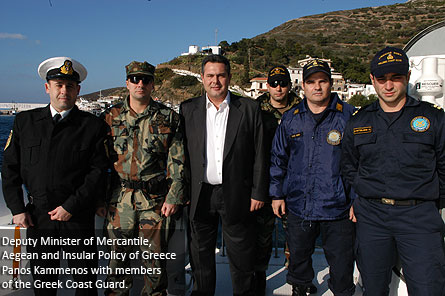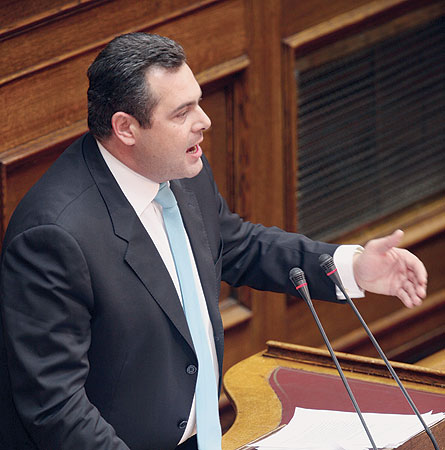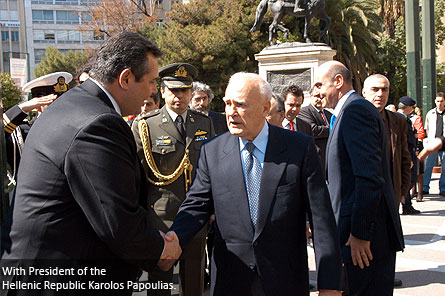Panos Kammenos on terrorism and illegal immigration: the European perspective
By Konstantinos Rhompotis
For Deputy Minister of Mercantile, Aegean and Island Policy of Greece Panos Kammenos, problems such as terrorism and illegal immigration, perhaps the toughest issues the West is facing nowadays, are very familiar. He served as Chairman of the Committee for the Security and Collaboration in the Mediterranean, Vice-Chairman of the General Committee of Political Affairs and Security of OACE-PA (Organization for the Security and Collaboration in Europe) and he is currently Special Representative of the Chairman of OACE-PA on Antiterrorism issues. President Sarkozy of France made him recently Knight of the National Order of Honor for his service in those fields. Although pro action and tough minded, he is very careful to point out that these problems need concerted effort to be dealt with and require looking at the causes provoking them. “Our obligation is not only to focus on developing strategies and systems to combat terrorism and illegal immigration… The real challenge is to improve life conditions in poor underdeveloped countries.” Panos Kammenos was elected Member of Parliament for the first time in 1993 with the party of New Democracy (the youngest in the history of the party) in Athens’ Second District. He was re-elected in 1996, 2000, 2004 and most recently September, 2007, when he was also named Deputy Minister of Mercantile, Aegean and Island Policy, one of the most important ministries given the fact that Greece ranks number one in the world in vessels carrying her flag and its mainland is surrounded by more than 3,000 islands! He is married to lawyer Helena Tzouli and besides his native Greek he is fluent in English and French.

In Greece and in the EU, you served in committees dealing with terrorism and President Sarkozy of France made you Knight of the National Order of Honor for your service. Terrorism is a big concern in the US and number on threat for our national security. How do you evaluate the international effort in combating terrorism and what in your opinion the major challenges will be in the time being.
After the terrorist actions on US, Spain and many other countries around the world, security measures - especially in airports - reached a level that minimized significantly such threats. Additionally the cooperation and the exchange of information between countries are considered now a major tool to combat terrorism. Countries more than ever are willing to share important information that can prevent terrorist attacks.
The international effort in combating terrorism is in a very good path. However, we must not rest because terrorism is an “industry” that advances in a very fast pace. We have to be always one step ahead and this is a major challenge for all countries. Today, fight against terrorism is essentially an alliance among Democratic states and citizens as counter terrorism requires a common front of citizens and authorities. Terrorist targets are not public persons or politicians anymore. Their attacks have mass distruction effect and highly affect the psychology of the people of the country under assault. In addition to that, we can observe that terrorist organizations cooperate – Al Qaida is the first to do so – with Middle East terrorists and others acting in Chechnya for example. There are active cores all over Europe. Modern day terrorism concerns all citizens in the free world.
In the maritime field there is ISPS Code dealing with possible terrorist action against cargoes, trades but also passengers. The US has taken some additional steps concerning vessels’ traffic due to the constant threat your country is subject to. Greece and the Ministry of Mercantile Marine, Aegean and Island Policy is, in my opinion, an illustrating example of accepting these international rules without causing any obstraction to free trade and transactions.
Q) What about illegal immigration, as countless are the cases of Turkish ships smuggling desperate people from the Middle East to the Greek shores.
A) The Ministry of Mercantile Marine, Aegean and Island Policy is responsible for the surveillance of border illegal migration in Greece which has increased a lot during last year and in particular in the eastern Aegean. In 2007, we received more than 8.000 illegal migrants. The Hellenic Coast Guard carries out surveillance operations on a 24 hours basis. However, as human life is the most important aspect to us, these operations become search and rescue operations. Illegal migrants when approaching Hellenic territorial sea coming from international sea waters, sink their boats and fall overboard so that the Hellenic Coast Gurad is called to rescue them rather than forbid them to enter the country. As Greece is responsible for search and rescue operations in the Aegean, they enter the country as persons retrieved by sea following rescue operation. Our position in this issue is that European cooperation must be sought and implemented. According to Hellenic law, they are subject to trial for 6 months, their personal data are recorded and they are set free. About 85% of them head to European Union and other Schengen Treaty countries. Most of them are migrants seeking a better life in the free world. Some come from countries where terrorism is flourishing. The majority come from Palestine or Iraq in order to avoid extradition, as there is no extradition treaty between us and those countries. This issue does not concern Greece exclusively. Our government has proposed the establishment of a European Coast Guard dealing with this problem, starting from North Africa and going all the way to Turkey, which, despite the fact that it has signed a protocol for repatriation of illegal migrants, does not observe it. There are cases in which Turkish Coast Guard rather facilitated migrants trafficking than inhibit it. This is a serious problem and we have requested US and European Union assistance.

Q) Greece has managed to become number one maritime power in the world, an impressive feat. What does that mean for the country, for the world and how did you get to be on top?
Greece without her merchant fleet would be just a country surrounded by sea. Thanks to Greek seamanship and maritime tradition and values, our ships surround the whole world! Places in Greece with maritime tradition as Andros, Chios, Galaxidi, Mytelene, Oenousses, Kassos, as well as most of the other islands are where seamen are born and raised. This human element is what made Greek shipping a big power.
Today, in the middle of another international economic crisis, shipping flourishes. This is due to the fact that in highly populated countries such as China and India, living standard is rapidly and constantly increasing. These markets have now opened to the rest of the world and oil and goods traffic demand is going upwards while production and exports follow a rate of increase.
We will make Piraeus a big international shipping centre. I can tell you that currently, shipping exchange inflow in the country is about 18 billion dollars yearly and that accounts only for 25% of shipping transactions. If we manage to bring back to Greece the remaining companies, we shall boost our national economy significantly. This is what Mr Voulgarakis – Minister of Mercantile Marine – and I fight for every day and shall continue to do so.
We have an excellent cooperation with U.S.A. and I would like to officially announce something which is not known yet: The US government has donated to Greece, by a special Congress law, a Liberty vessel, the last one found in the country. The Liberty-type ships were among the first vessels which led to the development of our mercantile marine. As a Deputy Minister I had the pleasure of obtaining the amount of 5 million dollars from Greek ship owners so that the vessel gets approval of the Maritime Department to sail to Greece this summer. It was an important work carried out by the initiative and efforts of Greek-American politicians. The vessel will be a floating museum which will show the major assistance Greece received after the Second World War by the U.S.A. in the field of mercantile marine. It is a landmark in the history of Hellenic shipping, born ten thousand years ago and thrived through the millenia in order to become today world leader.
Q) Greece’s low birth rate to what extent affects insular policies and what measures are you taking in order to address this problem? Are you planning to create zones where people, Greeks and non-Greeks, could come and settle, create, organize cultural heavens or things like that?
A) We have initiated big projects for the support of our small islands. Greece is an island country with many peculiarities and islands which during these last decades tend to lose their population due to their isolation.
At this moment, we try to change non-profit ferry lines to Greek islands into profitable ones. We have started big projects for the development of diving sports, which on account of the sea’s high temperature can be pursued 7 – 8 months a year. We are also moving on with island autonomy projects. The islands with desalinators of their own, have sufficient water throughout the year. We promote broadband, all islands will have quick and easy access to Internet by October 2008, so that students will be able to have access to information, libraries etc. We are also implementing e-learning projects that offer children foreign language courses and assistant teaching.
In addition to that, we have established the Aegean Festival which shall take place in Lemnos, Kasos etc and shall promote the tradition, culture and customs of each island.
Another field included in our policy, which shall be developed in the future, is the environmental tourism. We have established in low populated islands zones free of environmentally damaging products. They will be ecological destinations for any tourist to come and live in a place free of plastic, pesticides and other chemicals, just like in the old days.

We are also developing religion tourism. Pilgrimage in the Aegean is a unique experience. Mantamado in Mytelene, Archangelos Panormidis in Simi, Madonna in Tinos, in all islands with a long religious tradition we seek to attract tourism who can appreciate Christian spirituality.
There are also destinations of particular interest such as Nissyros, where we invested in hot water springs turning them into a big modern spa complex. We created geological parks, as is the case with the fossil forest in Mytelene, Santorini, Nissyros and Milos. We promote particular products of each island such as the mastiha resin in Chios. All these actions are aimed at extending the tourist season, which in turn will lead into further economic development, keeping locals on the islands. In Simi, for example, home value has gone up fifty times during the last four-five years.
Q) Most Americans view the Greek islands as places to visit and have unforgettable vacations. I’m sure there is more than that though. What about investment opportunities?
A) The initiatives that I just mentioned are also aimed at providing new conditions for people to both visit and invest. For example, the big hotel complex of Agios Kyrikos, in Ikaria, is the result of such an investment by Greeks who returned from abroad.
What we also seek to do as a government is to ensure that all people coming to invest, will find a safe environment to put their money in. We are doing our best to see that both national and foreign investors in Greece are protected against fraud. Everything is done according to law with corruption and red tape allowed no place.
Q) You’ve done work in promoting Orthodox Christianity in the world and you’ve been honored by the Patriarchates of Jerusalem and Prague. According to the Archons of St. Andrew website, the Ecumenical Patriarchate in Constantinople is facing enormous challenges from the unceasing efforts on behalf of the Turkish government to drive it to extinction. A few months ago an old church was demolished by the authorities in Pringiponesa, hours before Prime Ministers Karamanlis and Ergogan inaugurated the new gas line. In what ways your government is dealing with Turkey’s intransigence and inconsistency regarding its obligations to international treaties and its bid to join the European Union.
A) As far as the European Union is concerned, Turks will not be the exception to the rule. They have to comply with the EU directions and standards if they want to become a member. I strongly condemn such actions as the demolishing of religious and cultural facilities, Greek or other. One’s civilization is judged from his ability to recognize and respect different religions and cultures. I would say that it was a rather provocative and useless action aiming to jeopardize the meeting. Such actions at the end have reverse results and influence the public opinion in the victim’s favor. I will continue my efforts to protect our civilization and religion not only in Constantinople but all over the world.
As regards the Ecumenical Patriarchate issue, the Chalki School and the human rights issues in Turkey, the US has always been on our side, because our position is in accordance with the international law. Turkey has signed the Treaty of Lausanne and its provisions are clear when it comes to the above mentioned issues, the Hellenic community’s property rights and the status of the Imvros and Tenedos islands. In this case we simply ask that the international law be observed and enforced.